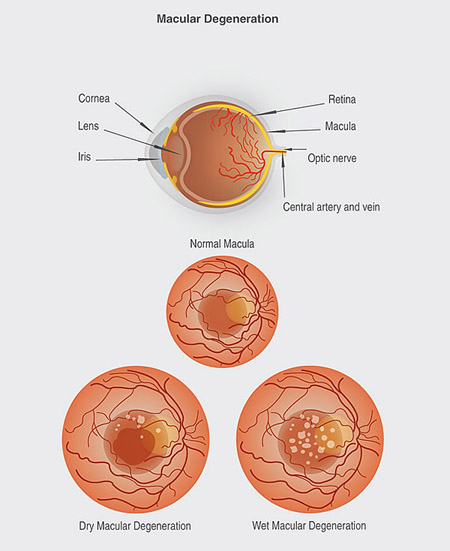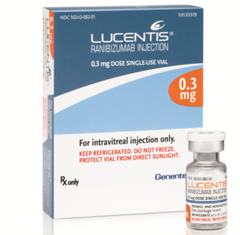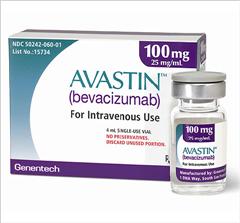Age-Related Macular Degeneration, or AMD, is a disease that may cause rapid vision loss if left untreated.
Dry AMD is the most common type of macular degeneration and affects 90% of the people who have the condition. In the dry form, there is a breakdown of the RPE, a retinal layer in the macula. The degeneration of these cells is called atrophy. It is characterized by the presence of drusen (crystalline deposits that develop in the retina). Dry AMD reduces central vision and can affect color perception.
Wet AMD is a chronic condition that cannot be cured, but can be managed. Wet AMD can progress quickly, and without treatment, the disease will get worse. 85% of all patients who are legally blind from macular degeneration have the “wet” form. Wet AMD occurs when too much of a protein in the eye, called VEGF, causes abnormal blood vessel growth. As the blood vessels grow, they can leak blood and fluid, which damages the macula, often causing loss of vision. The exact cause of wet AMD is not known. However, there are a number of risk factors that may play a role.
These risks include:
- (55+ ) Age
- Smoking
- Race
- Family history of AMD
- Heart disease
- Obesity
- Gender
- Low levels of certain nutrients
Talk with Dr. Thomas today to determine what you can do to reduce some of these risks.

Treatment of Macular Degeneration:
Unfortunately, the dry form of macular degeneration is not curable, but there are steps you can take to slow down the progression of dry macular degeneration to wet. Specific formulations of antioxidant vitamins have been statistically proven to help slow down the progression of macular degeneration. The development of new pharmaceuticals has enabled us to successfully stop the loss of vision in 90% of our wet macular degeneration patients, with 60% actually improving, and 30-40% achieving 20/40 or better. The VEGF inhibitors are pharmaceuticals that are directly injected into the eye.
All state-of-the-art treatments for macular degeneration are performed here at the Omaha/Lincoln Eye and Laser Institute. Along with regular check-ups and current treatments, patients with macular degeneration can hope to retain maximal vision for as long as possible.
LUCENTIS® (ranibizumab injection)
 LUCENTIS is an FDA-approved treatment for wet age-related macular degeneration (AMD). LUCENTIS is an injection given into the eye. Before you get your LUCENTIS injection, your eye will be prepped—or cleaned thoroughly—to help you avoid eye infections. Then your retina specialist will numb your eye to limit any discomfort you might feel. Many people who get injections for wet AMD feel some pressure on their eyes. Most of the time this pressure is all you will feel. After your retina specialist gives you the injection, the pressure should go away.
LUCENTIS is an FDA-approved treatment for wet age-related macular degeneration (AMD). LUCENTIS is an injection given into the eye. Before you get your LUCENTIS injection, your eye will be prepped—or cleaned thoroughly—to help you avoid eye infections. Then your retina specialist will numb your eye to limit any discomfort you might feel. Many people who get injections for wet AMD feel some pressure on their eyes. Most of the time this pressure is all you will feel. After your retina specialist gives you the injection, the pressure should go away.
Important facts about LUCENTIS:
- It is FDA approved for wet AMD and was developed specifically for use in the eye
- Efficacy and safety of LUCENTIS was tested in clinical studies of more than 800 people over 2 years
- In clinical studies, patients treated monthly for up to 2 years saw their vision stabilize or improve. In fact, 9 out of 10 people saw their vision stabilize (which means they lost fewer than 15 letters on the eye chart), and up to 4 out of 10 people saw a 3-line gain on the eye chart (which means they could see an additional 15 letters)
What could LUCENTIS mean for you?
You may be able to improve or maintain your vision—and keep doing the simple things you enjoy. Remember, wet AMD is a chronic condition and there is no cure. But it can be managed with regular treatment with LUCENTIS.
Results with LUCENTIS® (ranibizumab injection)
LUCENTIS is an FDA-approved treatment for wet age-related macular degeneration (AMD). During key clinical studies lasting 2 years, people taking LUCENTIS monthly saw the following results:
- 9 out of 10 patients saw their vision stabilize
- Up to 4 out of 10 people saw a 3-line gain on the eye chart, which means they could see an additional 15 letters
- A few people did have some vision loss
Everyone responds differently to LUCENTIS, and some people see results faster than others. Even if your vision stabilizes with LUCENTIS, you may still need to continue with regular treatment. Also, you may not see results right away. But don’t get discouraged. You may see changes over time.
Avastin
 Researchers announced that early study results indicate that a potential new age-related macular degeneration (AMD) therapy may improve vision within one week of injection at the Macula Society meeting of international retinal specialists.
Researchers announced that early study results indicate that a potential new age-related macular degeneration (AMD) therapy may improve vision within one week of injection at the Macula Society meeting of international retinal specialists.
Avastin, the drug used in initial studies, works by inhibiting the growth of abnormal blood vessels in the back inner part of the eye (retina), a condition that occurs in the “wet” form of AMD. The use of Avastin for macular degeneration is “off label.” It is not manufactured to the quality standards for an ophthalmic drug and no ocular safety testing has been done.
A potential advantage of Avastin over other therapies for wet AMD is that vision improvement can occur within one week of treatment. In addition to the improved vision, Avastin causes a reduction in leakage from the abnormal blood vessels and restoration of normal macular anatomy.
Patients with neovascular or the wet form of macular degeneration are thought to have elevated levels of vascular endothelial growth factor (VEGF) in their affected eyes. VEGF is a protein that causes abnormal blood vessels to grow, leak, bleed, and damage the macula resulting in vision loss. New anti-VEGF drugs work by blocking this protein and the formation of abnormal blood vessels that grow in the eye.
Avastin therapy isn’t a cure and it’s not the right treatment for everyone with wet AMD. Avastin is only for patients in the early stages of the disease and should be used within 6 months to 12 months from the time of onset. What this offers us is a new potential option for patients with wet AMD. It also provides us with additional evidence that VEGF is the major factor for blood vessel growth and vision loss in wet AMD.
All state-of-the-art treatments for macular degeneration are performed here at the Omaha Eye and Laser Institute. Along with regular check-ups and current treatments, patients with macular degeneration can hope to keep as much vision as possible for as long as possible.
Macular degeneration is a difficult disease but with motivation and patience, its effects can be significantly reduced. Early treatment and preventative measures can help slow down the condition and low vision rehabilitation can help people to lead an independent lifestyle.


